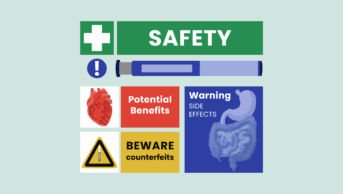
Shutterstock.com
Coroners have raised concerns with various government bodies 20 times since 2013 over the regulation of the supply of drugs online, an analysis of reports published on the Courts and Tribunals Judiciary website has found.
The Pharmaceutical Journal searched through regulation 28 reports — also known as ‘Prevention of Future Deaths’ reports — from July 2013 to March 2023, for mentions of internet and online pharmacy.
Concerns raised by coroners in the 20 reports identified included that many dangerous drugs are “freely marketed” online, with “no regulation” in their supply, and that drugs purchased online ranged from the unlicensed opioid acetylfentanyl — which studies have shown is 15 times more potent than morphine — to the so-called ‘diet pill’ 2,4-Dinitrophenol (DNP), to prescription-only medicines, such as codeine.
Two coroners warned that the lives of vulnerable people are specifically at risk as “no protection is afforded” to them prior to making drug purchases online. In addition, one coroner warned that further deaths would occur “unless steps are taken by central government to screen and close down websites” that sell dangerous non-prescribed medication, while another called for “the regulation of the internet” in relation to drug supply in 2015.
But, as of 2022, one coroner said it was “not clear which organisation or department of government should have responsibility for monitoring” such sites.
Regulation 28 reports are legally required from a coroner when they believe action should be taken by a person, organisation, local authority or government department or agency, following a death that they have investigated. The government has responded to several of the coroners’ concerns, citing a list of measures undertaken to mitigate the risk of drugs supplied over the internet.
The measures include the implementation of the European Falsified Medicines Directive (FMD), which had required the UK “to introduce national arrangement to register suppliers of medicines at a distance” and required sites “to display the EU logo”, the Department of Health said in one response. But this requirement ceased to apply when the UK withdrew from the EU in January 2020, leaving a voluntary internet pharmacy logo scheme operated by the General Pharmaceutical Council (GPhC) in its place.
In another case, the Home Office responded to say that it had shut down a website used to purchase drugs, including benzodiazepines, responsible for the death of former paramedic Jason Houghton. However, as of 29 March 2023, The Pharmaceutical Journal found that the Pakistan-based website is still selling prescription-only medicines, including diazepam for US$5.99 and tramadol for US$7.50.
“Unless there are tighter controls implemented, then the problem is not going to be solved,” said Keith Houghton, Jason’s father. “How many others have died since Jason, in 2014? How many more parents have grieved since then because those sites selling drugs to our kids have still been accessible at the click of a button?”
Most recently, Catherine McKenna, area coroner for Greater Manchester North, wrote to health secretary Steve Barclay on 7 February 2023 following the death of Ania Sohail, who was able to obtain “propranolol medication on seven separate occasions from four different online pharmacies”.
“On each occasion, Ania had completed an online questionnaire in which she … declined consent for the prescriber to share information with her GP,” McKenna said in her report. “As a result, it is currently possible for a patient to obtain excessive quantities of medication by simply placing multiple orders with different online pharmacists.”
Duncan Rudkin, chief executive of the GPhC, said the lack of requirement for prescribers to contact a patient’s GP before supplying medicines online is particularly a problem when somebody “is going to a number of different providers in a short space of time”.
“Each of them can be doing more or less a good job at mitigating the risks associated with each transaction, but nobody’s in a position to put the whole picture together … then there’s a kind of a concatenation of risks that come together,” he said.
“That’s an example of a big-system issue that is way beyond the remit of the GPhC,” he continued.
Commenting on the analysis, Andy Morling, deputy director of criminal enforcement at the Medicines and Healthcare products Regulatory Agency (MHRA), said: “The MHRA’s Criminal Enforcement Unit works hard, in collaboration with law enforcement, wider government and cross-sector partners, both at home and abroad, to help protect the public and defeat this harmful trade.”
He added that the MHRA participates in Operation Pangea, an annual international initiative to target the illegal internet trade in medicines, which is led by Interpol and saw law enforcement officials shut down more than 4,000 websites containing adverts for illicit products in 2022.
In March 2023, three UK members of an international organised criminal gang were sentenced to jail, after pleading guilty to illegally selling more than 3 million doses of prescription-only and unlicensed medicines, including codeine, tramadol and diazepam, over the internet.


